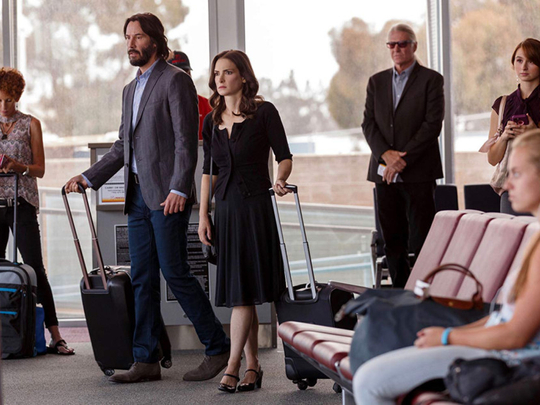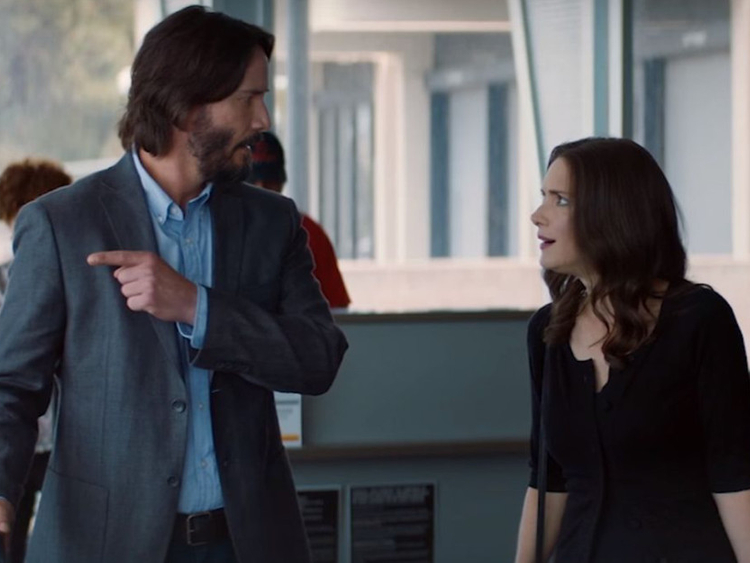
Keanu Reeves and Winona Ryder reunite on-screen for the third time in Destination Wedding, the refreshingly unconventional romantic comedy that accurately captures the beginning of a relationship: awkward and occasionally off-putting. The cuddling is cumbersome, the sex sounds are displeasing, and, frankly, the only advantage of showering with another person is to simply to sing loudly together.
Reeves (who plays Frank, a pessimistic intellectual) and Ryder (who plays Lindsay, a heart-broken optimist) meet at a wedding they probably shouldn’t have attended. In the picturesque wine region of Paso Robles, California, they butt heads and bond over existential conversations about the horrors of travelling, the narcissism of weddings and the unlikelihood of love altogether. Yet after a ton of deadpan humour and lyrical dialogue, we hope they’ll be the exceptions to their own rules.
Destination Wedding writer-director Victor Levin (5 to 7, Mad About You) chats about what it’s like to craft an unsentimental romcom.
Why the aversion to destination weddings?
I’m happy to go and honoured to be invited, but there’s a certain self-importance to it, is there not? It’d be one thing if you had to take a long, expensive plane ride to the bride or groom’s hometown. I get that; people live somewhere. But my wife went to Scotland for a wedding in a castle. Nobody [in the couple was] Scottish, there’s no earthly reason to go to Scotland for that — to Scotland they went!
To play the trumpet that loudly is, to me, just asking for trouble. You’re not the first two people to get married! The future is promised to no one! Take it easy and accept your good fortune with humility! Unless you know you’re going to have the all-time greatest marriage that’s gonna last forever and go down in history to serve as an example to every other married couple for the rest of time, do it with a little modesty. That’s just my opinion.
Destination Wedding only has two speaking characters — an on-screen rarity. I felt like I was watching a play.
I like writing arguments, and this is effectively a 90-minute argument between these two. We’ve seen so many plays like this, but why can’t a movie be just about talking? Part of the reason was financial, to make a movie at as low of a cost as possible so that it had the best chance of succeeding in the marketplace. Independent films are not a charity; we should not be costing our investors money for the privilege of expressing ourselves.
What’s the biggest difficulty of making a movie with just two speakers?
You’re asking your actors to be relentlessly appealing because there’s nowhere to go for a rest. And you’re asking them to master a mountain of material. People may not realise how verbally gifted Keanu is — he’s a virtuoso, linguistically. If you really listen to Bill and Ted’s Excellent Adventure, you see what I’m talking about: a person with an encyclopedic mind, who understands every syllable and delivers it like music. It may be a surprise to some of his fans, but he’s just really good at this.
And Winona is a brilliant person — extremely well-read and superb in conversation, with all sorts of facts at her fingertips, and very aware of the melody and cadence of dialogue. And there’s nobody more likeable on-screen than Winona Ryder — she’s just so lovable and you root for her. It was fun to put a certain amount of disappointment and cynicism into the psyche of her character, who remains so hopeful even as so many horrible things have befallen her in life. It becomes heroic to be hopeful when you’ve been hammered.
This movie captures what it’s like to be single in the current climate when cynicism is more common and lifelong singlehood is actually quite attractive.
The reason the television [in Reeves’ room] always has some version of the four talking heads on cable news, screaming at each other and not really hearing each other, is because that’s what the world has become. We behave badly publicly and privately, when we’re on TV or looking for a parking space. Rudeness is OK; it becomes acceptable to be mean to strangers and air all your grievances and be judgemental and shut down. The base level of compassion and kindness in our day-to-day lives has never been lower — that includes the Vietnam War and Richard Nixon and the near-bankruptcy of New York City.
It’s hard enough to love each other, to fall in love and find a mate under the best of circumstances. But now, in this toxic, cynical environment, it’s even harder. How are you supposed to deal with all of this grave disappointment? Do you curl up in a little ball, or do you put your head back in the chopping block and make yourself vulnerable and risk terrible injury yet again? Do you ever bet on the triumph of hope over experience? I think you do.
With Book Club, Set It Up, Crazy Rich Asians, To All the Boys I’ve Loved Before and more, this summer has been a romcom renaissance. What’s so great about this genre?
I don’t think there’s anything better that you can write about than love in its various forms: romantic, familial, fraternal, whatever you want. It’s the best thing that humans are capable of. I enjoy never having to spend a second on the question: Is this goal-worthy? Because if the goal is to find the buried treasure or win the war or whatever, I guess those are worthy goals but only because the movie is telling you so. But love, in any movie that asks you to root for it, is a worthy goal based on life experience. And with society the way it is now, I think every story that trumpets something positive and life-affirming is good for us.
Don’t miss it
Destination Wedding releases in the UAE on September 13.














